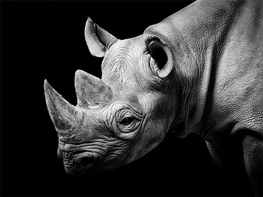Africa gateway
Collaborative efforts at CITES CoP17 in South Africa
Continental agreement
The 12 African rhino range states and ex-range states have agreed on an overall strategy to tackle poaching and increase the population of the animals in the coming five years. Molewa launched the African Rhino Range States’ African Rhino Conservation Plan on the sidelines of the conference on 25 September.The African rhino range states and ex-range states are Angola, Botswana, Kenya, Malawi, Mozambique, Namibia, South Africa, Swaziland, Tanzania, Uganda, Zambia and Zimbabwe. Spanning a period of two years, with discussions spread out over three workshops, the plan took shape. The minister emphasised that it was important for the range states to work together to increase rhino populations. But the plan would not override current national plans. The African plan focused on general principles of conservation on which all states could agree. “[It] seeks to complement [national plans] by providing an overarching higher-level umbrella plan under which all the national plans can fit,” she said. “The continental plan also seeks to identify and focus on areas where collectively and co-operatively there may be opportunities for range states to work together to enhance rhino conservation.”Minister Molewa addressing the side event of the rhino conservation range states action plan #CITES #CoP17 pic.twitter.com/eQjNzFrILk
— Environmentza (@environmentza) September 25, 2016
Key points
- Protection, law enforcement, investigations and intelligence: to implement legislation and strengthen law enforcement actions between both countries and different departments of government; improving investigation and collectively sharing knowledge, skill and state of the art technology;
- Biological management: to achieve the envisioned growth rate to sustain, and manage the rhino population and to conserve genetic diversity through standardised monitoring;
- Co-ordination: to improve co-ordination between range states by active involvement on an international scale;
- Socio-economic: creating support for conservation by tapping into the local population through empowerment of people;
- Political support: to boost collective continental political support for rhino conservation;
- Communication and public support: to garner understanding and support from the public and all stakeholders involved in rhino conservation through targeted communication;
- Capacity: to make certain there are enough human resources used wisely, and make sure they are appropriately trained and equipped; and,
- Adequate financing: to explore and develop financing mechanisms and structures to make sure efforts are sustainable.
The Convention
CITES is an international agreement between governments. Its aim is to ensure that international trade in specimens of wild animals and plants does not threaten their survival. States that have agreed to be bound by the Convention are known as Parties. Although CITES is legally binding on the Parties – in other words they have to implement the Convention – it does not take the place of national laws. Annually, international wildlife trade is estimated to be worth billions of dollars and to include hundreds of millions of plant and animal specimens. The trade is diverse, ranging from live animals and plants to a vast array of wildlife products derived from them, including food products, exotic leather goods, wooden musical instruments, timber, tourist curios and medicines. Wildlife and forest crime is not limited to certain countries or regions, but is a truly global phenomenon. Source: Flauna and South Africa.info reporter Would you like to use this article in your publication or on your website? See Using SouthAfrica.info material An African continental plan to save the rhino population, agreed by the African rhino range states, is launched at CITES CoP17 on 25 September 2016. (Image: Flauna, Facebook)
An African continental plan to save the rhino population, agreed by the African rhino range states, is launched at CITES CoP17 on 25 September 2016. (Image: Flauna, Facebook)
Related links
Related articles
- South Africa prepares for CITES CoP17
- Orphaned baby rhino named
- South African rhino film wins award in New York
- Rhino poaching: behind the scenes with South African rangers
- South African rhinos need technology to curb poaching
- Maasai cricket team want to knock rhino poaching for a six
- South African anti-poaching unit Champions of the Earth
- Elephants find sanctuary in southern Africa
- South African sisters ride for rhinos
- South Africa to host next Cites conference



